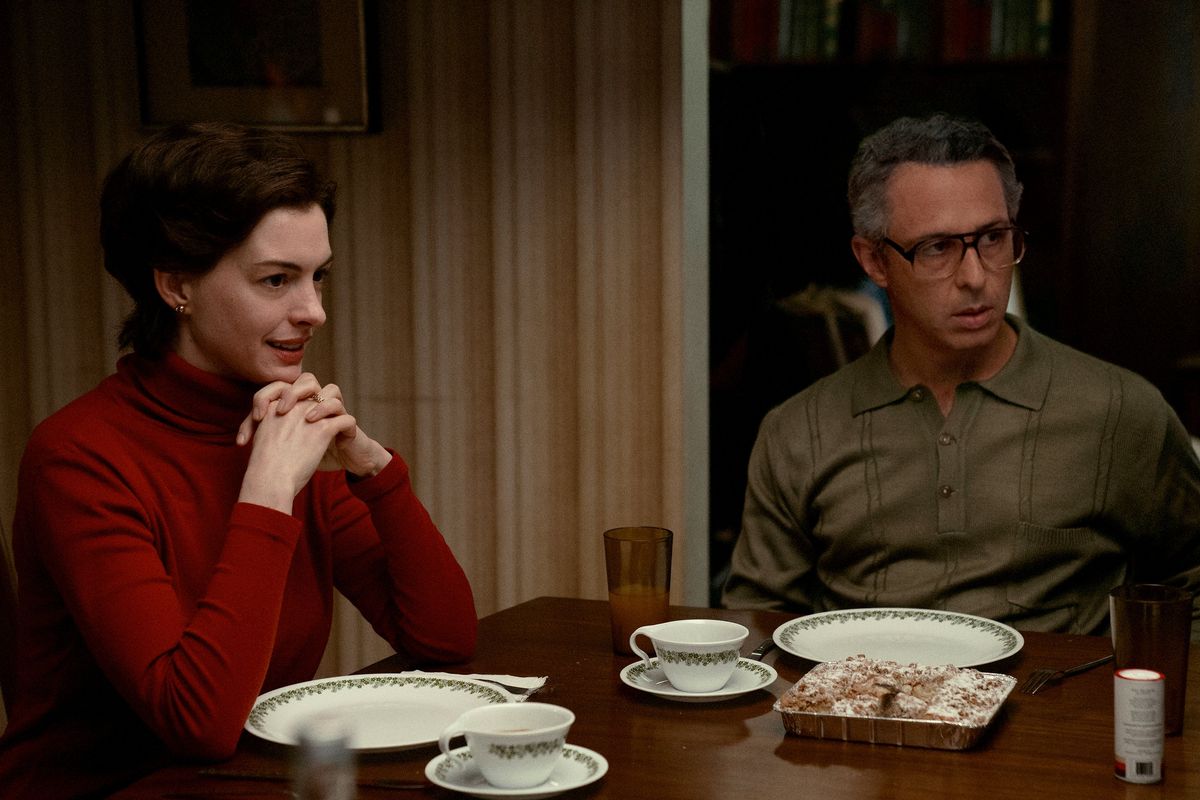Movie Review: ‘Armageddon Time’: Privilege and punk rock in 1980s Queens

In “Armageddon Time,” James Gray’s evocative portrait of his early years growing up in Queens, Banks Repeta plays Paul Graff, a boy entering sixth grade in 1980, when punk rock, disco, rap, national politics and New York City itself were changing and sometimes converging with apocalyptic force.
Gray takes his title from “Armagideon Time,” a reggae song covered by the Clash. But it gets to the bad vibes that Paul is picking up, in speeches by presidential candidate Ronald Reagan (“Morons, from sea to shining sea,” one of his parents sniffs on election night) and in his own household. That boisterous ecosystem is watched over by Paul’s mother, Esther (Anne Hathaway), a smart, no-nonsense educator, and his authoritarian father, Irving (Jeremy Strong), whose bespectacled quietude belies volcanic anger.
“Watch out or you’ll catch your father’s temper,” Esther warns at one point, and from Paul’s terrified reaction we sense that it’s a real threat; later, we’ll see what happens when it comes to pass. But “Armageddon Time” isn’t a trauma narrative: Moments of warmth and contagious joy suffuse Gray’s memories, especially when it comes to Paul’s maternal grandfather Aaron, portrayed by Anthony Hopkins with avuncular directness.
“Armageddon Time” dramatizes a pivotal year in Paul’s life, when he strikes up a friendship with a Black classmate named Johnny (Jaylin Webb) and begins to learn firsthand how racism operates on the most subtle and unspoken level. That he happens to be the beneficiary of a system that routinely gives him the benefit of the doubt begins to chafe against what he’s been told about his own Jewish heritage of survival against oppressive odds. Privilege, in Paul’s case, feels both hard-won and unearned.
“Life is unfair,” his grandfather explains at one point. “You make the most of your break, and you do not look back.”
Gray explores his own budding awareness of injustice in “Armageddon Time,” which like “Jojo Rabbit” and “Belfast” navigates daunting moral calculations through the eyes of an intuitive but also uncomprehending child. That implicit naivete can be a dodge, and there are times when Gray slips into sentimentality and self-congratulation. But “Armageddon Time” also presents an alternately tender and candid glimpse of what it feels like to be told one thing while knowing the opposite is true deep in your bones.
Paul and Johnny bond over a shared sense of humor and taste in music (“Rapper’s Delight” and “The Hustle” pop up in the soundtrack alongside the title cut and a song by Boz Scaggs), but their friendship indirectly leads to Paul getting transferred from his public school to the militarylike institution his brother attends. There, he has an encounter with larger-than-life figures who give “Armageddon Time” yet another layer of cognitive dissonance – Jessica Chastain appears in a cameo, delivering an aria of entitled resentment in which her character camouflages the realities of her inherited wealth with rhetoric about “good old-fashioned hard work” – as well as a frisson of surreal prescience.
Paul instinctively recoils from the hypocrisies around him, and late in “Armageddon Time,” his grandfather gives him an invaluable tutorial in how to be a mensch rather than a passive bystander. But Paul is not above profiting from his own place in the pecking order he’s beginning vaguely to understand: When his friendship with Johnny grows more complicated, at one point involving a misguided scheme involving some school computers, the stakes of his life lessons in how whiteness works become exponentially higher.
“Armageddon Time” is a pungent, disarmingly honest evocation of love and loyalty, striving and struggle, and how identity morphs from one generation to the next.
In revisiting his own coming of age, Gray has managed to illuminate a much larger one that hasn’t stopped.